Aberdeen’s famous rout of FC Copenhagen still means as much to man-of-the-match hero Jamie Smith 16 years on as it does to the Red Army.
In December 2007, the underdog Dons secured their passage from the groups to the Uefa Cup knock-out phase by thumping their illustrious Danish visitors 4-0 in one of Pittodrie’s greatest-ever European nights.
Attacking midfielder Smith’s individual performance in the victory, including two stunning goals, was the defining display of his four seasons at Aberdeen.
Speaking exclusively to The Press and Journal, he told us memories of the night Jimmy Calderwood’s Aberdeen put then-Champions League regulars Copenhagen to the sword will never leave him.
Smith said: “Whenever I think back on my time at Aberdeen, the memory which springs to mind is the Copenhagen game.
“They were a good outfit and had some good players. And they caused us a few problems I think in the first half.
“At half-time, I can’t remember if it was the gaffer or Jimmy Nic (Calderwood’s assistant Jimmy Nicholl) or (coach) Sandy Clark who said to me: ‘Every day in training you’re taking shots at goal. We’ve got a half of football here – go and take some shots at goal.’
“I’d said to myself: ‘The first chance I get, I’ll have a go and we’ll see what happens.’
“I think it was a goal-kick from big Jamie Langfield and Lee Miller flicks it on. It’s just kind of sat up really nice, and I’ve thought: ‘here we go’.
“I knew I was pretty far out, the keeper’s probably off his line a bit and I had to get it up in the air to have any chance of it (going in).
“I caught it really well and the next 30 seconds, 10 seconds – I don’t remember – were celebrations, with loads of Aberdeen jerseys on top of me.”
The 47th-minute opening goal Smith described above, which saw him volley the ball over keeper Jesper Christiansen from distance, was the spark for Aberdeen in the second half against Copenhagen.
Smith would fire in another volley from outside the box for his second of the night eight minutes later, before Lee Miller’s cross was turned in for an own goal by visiting defender Mikael Antonsson on 71 minutes and Richard Foster made it 4-0 with seven minutes remaining.
Calderwood’s Dons team had gone into the Copenhagen clash knowing they needed a first Uefa Cup Group B win in their final fixture to secure third place – a position which brought qualification for the knock-out stages of Europe’s second-tier competition at the time.
Smith thinks sealing the third-place finish – and in such style – was a huge achievement for the Dons.
He recalled how they had previously “Mourinho’d” their way to a 1-1 draw against Dnipro in their qualifier second leg in Ukraine (following a 0-0 Pittodrie stalemate) to even reach the groups, defending for their lives to go through to the pool stage on away goals after Darren Mackie had given them a vital lead in the tie.
The Reds were then drawn in Group B with not just Copenhagen, but other Continental powerhouse names in Lokomotiv Moscow, Panathinaikos and Athletico Madrid.
Smith added: “We were the minnows of the group for sure.
“I think all those teams probably looking at the group when the draw came out would have said the same thing.
“For us to make it out of that group was a special thing, and the way in which we did – by humbling a renowned European team – made it that bit more special.”
Smith’s Dons spell hampered by multiple physical complaints – including losing his voice for SIX MONTHS
Fans’ favourite Smith was unable to feature in Aberdeen’s Uefa Cup last-32 defeat against German giants Bayern Munich – where the 2-2 first leg draw was another Pittodrie stunner under the lights – due to injury.
Coming through the ranks at Celtic before joining the Dons from Dutch side ADO Den Haag ahead of the 2005/06 season (and making an almost immediate impact with a late winner in a 3-2 Granite City win over Rangers in the August of his first campaign) highly-rated Smith’s next three campaigns with the club, from 2006/07 onwards, were hindered by physical setbacks.
His second season (06/07) saw Smith suffer a succession of groin and lower abdomen problems, including two hernia operations, although he did play in the dramatic 2-0 final-day home win over Rangers – remembered for Scott Severin’s wonder-volley to open the scoring – to finish third and secure European qualification.
The summer before Smith’s third campaign brought an ill-fated pre-season trip to Egypt.
Though he described the friendly matches the Reds played on the trip as “enjoyable”, Smith and team-mate Michael Hart were also involved in a car accident when the driver the pair had been assigned in Alexandria crashed.
The third season itself brought the highs of the Copenhagen game.
However, Smith made a slow start to the new term due to a virus also picked up in Alexandria and was also dogged throughout by calf issues – issues which he thinks were nerve-related and stemmed from a jolt to his lower back during the road incident in Egypt.
Smith’s persistent injury problems – which would then also follow him into his fourth season with the Dons – meant, as well as missing the Bayern tie, he watched the dramatic second half in Dnipro from the sidelines.
He then missed the subsequent Uefa Cup group games against Panathinaikos in Greece (3-0 loss) and the 1-1 draw with Lokomotiv at Pittodrie, and was forced off before half-time in the 2-0 defeat to Spain’s Atletico at the Vicente Calderon.
Perhaps the most bizarre physical concern which affected Smith during his time at Aberdeen were nodules on his vocal chords, which rendered him almost completely mute for six months in his second season and required two laser surgeries to remove.
He said: “It got to the stage where I completely lost my voice.
“I ended up going in, being put under and getting this laser surgery to remove them (the nodules). They biopsied them and there was nothing serious about them.
“For a week, I wasn’t allowed to try to speak – and if you’ve ever been in that predicament, it’s really difficult.
“But then they checked me again, because my voice wasn’t close to being back to normal. I got the camera up my nose and down my throat again, and they (the nodules) were back, and I had to go in and get a second laser surgery.”
Explaining how deeply the problems with his voice hit not just his professional football career, but his day-to-day-life around Aberdeen, Smith said: “(With) professional footballers, what a lot of people don’t see or hear is the amount of talking you do on a football pitch.
“You’re always talking – giving information to your team-mates, asking for the ball, ‘shift left’, ‘you can press there’… You’re talking all the time.”
The last time we played European group stage football at Pittodrie ⏪#StandFree pic.twitter.com/VKzwwRiRxh
— Aberdeen FC (@AberdeenFC) October 3, 2023
He added: “It was six months, maybe more than six months – a good chunk of time.
“We wouldn’t be having this conversation. Even with no background noise, you’d barely be able to hear me. My voice was so hoarse when I had it, then it went.
“I kind of forgot how difficult it was. It was debilitating.
“I would stop going into a coffee shop, because what’s the point? I would spend 10 minutes trying to get somebody to understand what I’m trying to order.”
Smith sad to see ex-Reds gaffer Calderwood struck down by Alzheimer’s
When he left Aberdeen in 2009 – the end of his contract after 102 appearances and 18 goals coinciding with Calderwood’s Pittodrie exit – Smith moved to the United States, ultimately joining Colorado Rapids, where he won the MLS Cup in 2010.
The cumulative impact of further injuries with Colorado, including a serious hamstring tear and ruptured cruciate ligament, led to Smith hanging up his boots in 2013.
Now 42 and living near Nashville, Tennessee, with his family, including wife Laura, father-of-three Smith has gone on to forge a career as a youth coach.
He managed MLS outfit Nashville SC’s academy before recently being named chief executive of Tennessee United – a grassroots club with 1,200 youngsters spread across “three or four” teams at each age group and with up to 60 coaches on their books.
Smith views his time at Aberdeen as the happiest period of his playing career.
The former attacker says it has been “sad” to see his ex-Dons boss Calderwood hit by early-onset Alzheimer’s disease, with the gaffer – one of Scottish football’s great characters – going public with his diagnosis in 2017 at the age of just 62.
Smith said: “It’s sad, because he was the life and soul of the party.
“After the games, he’d walk into the players’ lounge and he’d make sure he chatted to everyone’s spouse. And his wife and sometimes his grandkids were there.
“He was a huge personality, and that was just who he was.
“To see what he’s like now is just so sad, because it’s like a whole 180 from who he was.”
Describing how Calderwood put together a team who were “good mates” off the park, and not just footballing colleagues, 16 years on from the night those Dons humbled Copenhagen, Smith said: “I’ve got so many brilliant memories from my time there.
“I really enjoyed my four years, and wish I could’ve steered clear of the injuries, and I would’ve been happy to stay there my whole career to be honest.”
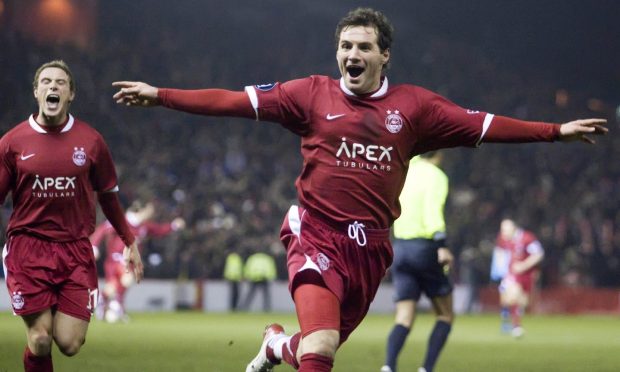
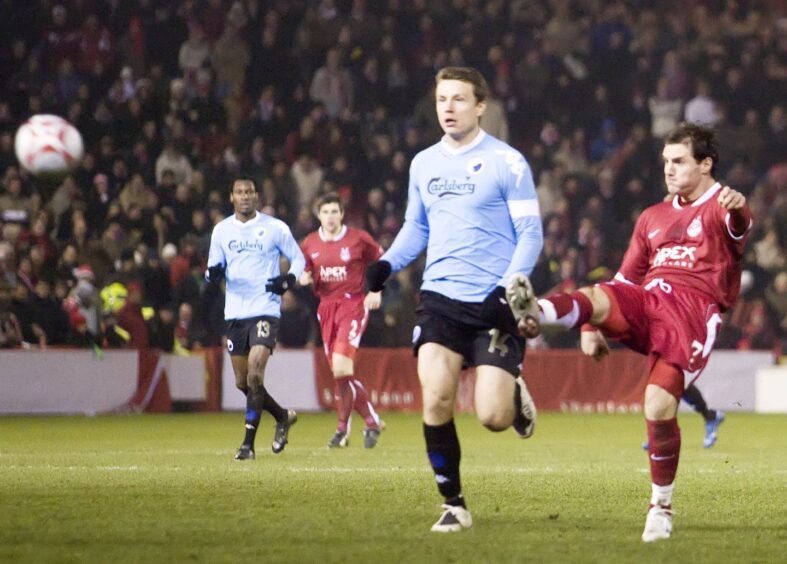
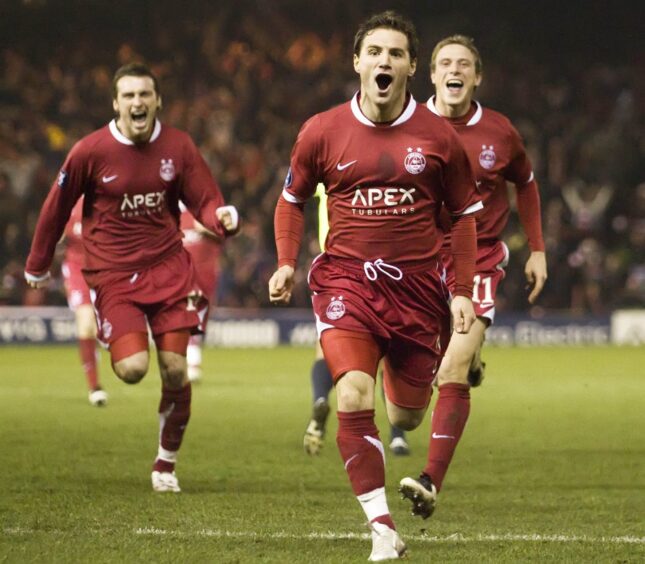
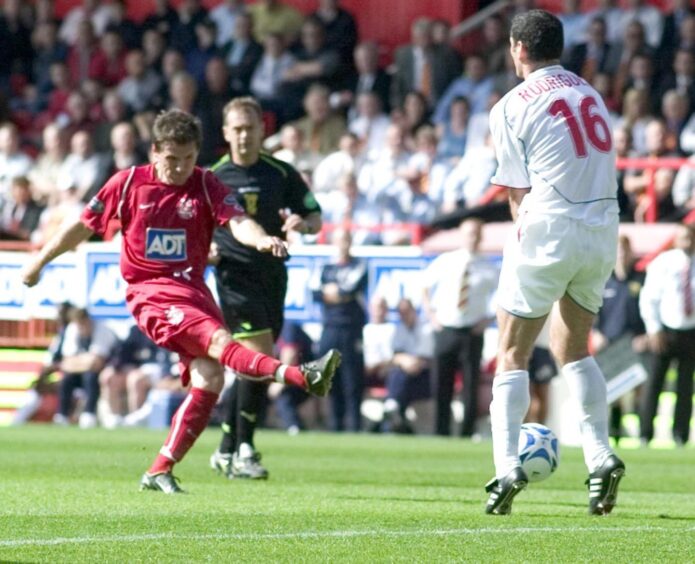
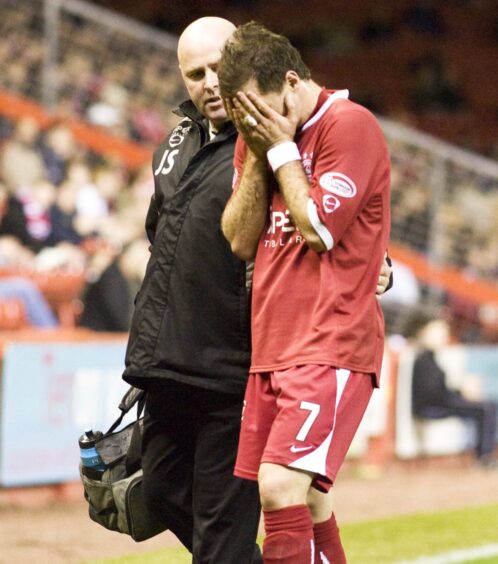
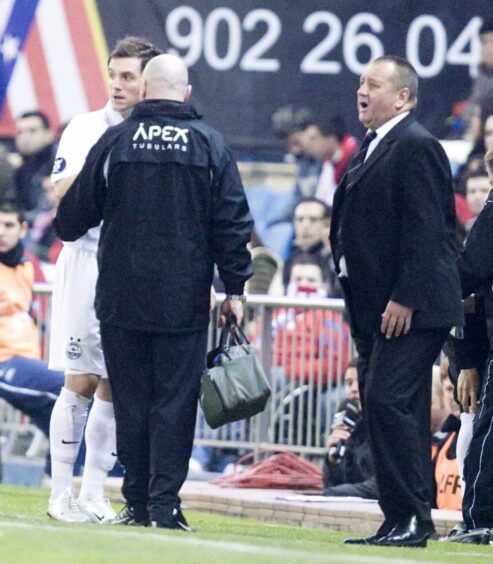
Conversation